Sustainable Seas projects in the Bay of Plenty feature in a new NZ National Commission for UNESCO launched website highlighting ocean science projects across Aotearoa New Zealand.
Te Tini a Tangaroa uses an online search tool to help connect New Zealanders and international audiences with ocean science projects underway in Aotearoa and the Pacific.
They also aim to promote the objectives of the UN Decade of Ocean Science for Sustainable Development.
One of the Sustainable Seas projects featured on the platform is Te Tahuhu Matatau, led by researcher Caine Taiapa of Manaaki Te Awanui.
Designed to enable kaitiaki, or guardians, of the Tauranga moana, the project is developing tools for marine decision-making. This follows on from their first research project, which discovered there are limited digital resources available for kaitiaki developed for Maori, by Maori.
Another project featured is Awhi Mai Awhi Atu, led by researchers Kura Paul-Burke of the University of Waikato and Richard Bulmer from NIWA.
This looks at habitat connectivity in Ohiwa Harbour near Whakatane.
It aims to better understand the degrading harbour and promote the recovery of the once abundant mussel reefs and shellfish.
The vision of Sustainable Seas is for Aotearoa New Zealand to have healthy marine ecosystems that provide value for all New Zealanders.
Funded by MBIE and hosted by NIWA, it has brought together around 250 ecologists, biophysical scientists, social scientists, economists, and experts in Maori knowledge and policy from across the nation.
The Sustainable Seas National Science Challenge has 14 research projects featured on the new website, 10 of which are led by Maori, hapu or iwi.
Each project investigates ways a more holistic ocean management approach can care for the vital ecosystems and services our oceans provide.
'Having a shared resource showing the benefits of ecosystem-based management is another step towards securing our moana as our playground, our food basket and our livelihood, for now and future generations,” says Sustainable Seas challenge director Julie Hall.
One of the highlights of the website is its spotlight on the importance of indigenous knowledge in ocean research. For seven years, the Challenge has brought together Maori-led or partnered projects, designed to give direct benefits to those iwi, hapu and Maori organisations involved.
According to Sustainable Seas manahautu Linda Faulkner, the research shows why supporting a place-based and Māori led-approach to applying Maori knowledge is crucial to the wellbeing of our marine environment.
'There has been limited success in attempts to apply a kaitiakitanga approach at a national level so far,” she says.
'Our evidence shows us kaitiakitanga occurs in place and through the relationship people have with the moana.
'As a result, we're developing tools and resources that support and empower iwi, hapu and Maori organisations to apply kaitiakitanga in place. This in turn has been shown to support and empower the relationship between the broader community and the moana as well.”
The NZ National Commission initiative echoes the global push to protect our oceans.
'While Aotearoa has over 15,000km of coastline, its importance for solving the challenges of our times has often been overlooked,” they say.
'Covering over 70 per cent of the Earth, oceans are a unique web of life that contain valuable food resources while acting as a sink for greenhouse gases.”



0 comments
Leave a Comment
You must be logged in to make a comment.